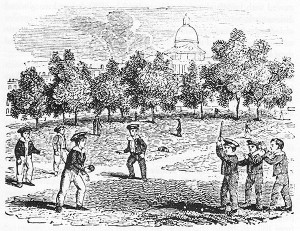Origins of baseball
This is about baseball, even though I may be the least qualified person at NCPR to hold forth on that subject.
On one of our recent rainy days I tackled a semi-tedious sewing repair. Something I could do while half-watching a DVD from my local library, “Moneyball“.
And? Well, the backpack’s broken zipper is replaced, hoorah! As for “Moneyball” I’d give it a lukewarm “meh”.
The trick to appreciating that movie would be to actually care about pro ball! Or to remember the 20-game winning streak from the Oakland A’s in 2002. It would probably help if I liked Brad Pitt too, which has been slow in coming. (Pitt’s acting seems to be improving with age, though.) Philip Seymour Hoffman practically disappeared into the role of head coach Art Howe – good job there!
“Moneyball: the Art of Winning an Unfair Game” was 2003 book by Michael Lewis well before the 2011 movie.
Despite my general indifference toward major-league sports, I do like history and the diverse stories behind things. So I watch movies like that as cultural homework.

In the 1700s game “Rounders” a successful batter would run around a pentagonal set of five bases, scoring a point for each base safely reached.
Which brings me to more along those lines. The BBC recently reported the discovery of the earliest mention of playing “bass-ball” now goes back to 1749 — in Surrey, England.
Author David Block has discovered the reference in the Whitehall Evening Post, dated 19 September 1749.
The Prince of Wales and the Earl of Middlesex played the game on what is now Ashley Park, Walton on Thames.
That the account includes Important Persons makes a certain kind of sense. (If plain old Tom, Dick or Harry played that new-fangled game of bass-ball it’s less worth writing up as news.)
A more breathless account can be found here from the Daily Mail, which crows that “the birth of baseball was in Britain!”
Who “invented” baseball, where it was first played – or first mentioned in print – does generate study and interest. This 2004 BBC article discussed a 1791 bylaw out of Massachusetts that mentioned base ball. The ordinance was:
…aimed to protect the windows in the town of Pittsfield’s new meeting house – by banning baseball within 80 yards of the building.
The bylaw would have been written before 1839, the long debunked date when baseball was thought to have been invented by Abner Doubleday in Cooperstown, New York.
The expert who moved that first-mentioned-in-print date all the way back to 1749 was American David Block, who has spent much time tracking the history of the game. Block is the author of a 2005 book “Baseball before we knew it: a search for the roots of the game“. (Which probably needs updating now!)
Are you curious where baseball came from? Or is it enough to watch and play the game now?
“Moneyball” depicts a shift in how teams are assembled, as with the use of statistical analysis to buy the best players for the least cost to arrive at a winning team.
I’ve already admitted that I neither knew nor cared about that when it happened. But for all you fans who do love the game, I am curious. What do you think of that development? Has that been good, bad, or indifferent in its effect on the game?
Tags: baseball, David Block, history, Moneyball, sports








now i’m curious– why ” bass ” ball and not any other fish?